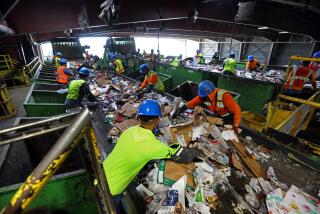Chemical agency ties under review
- Share via
The National Institute of Environmental Health Sciences has begun a review of ties between a federal health center that evaluates the risks of chemicals to reproductive health and a consulting firm funded by companies that produce chemicals linked to reproductive disorders.
The investigation follows a Times report on Sunday that Sciences International, an Alexandria, Va., firm funded by more than 50 industrial companies, helps manage the federal Center for the Evaluation of Risks to Human Reproduction.
Among the firms with financial ties to Sciences International are two that produce bisphenol A, a chemical in polycarbonate plastic bottles that has been linked in animal testing to prostate and breast cancer and reduced fertility.
Since 1998, Sciences International has helped manage the federal reproductive health center and prepared draft reports analyzing bisphenol A and 16 other chemicals. The company has a $5-million contract with the center.
The center’s scientific advisory panel was scheduled to decide today whether bisphenol A endangers reproductive health in humans.
But on Tuesday, director Michael Shelby announced that the panel, after two days of reviewing the 372-page report that Sciences International prepared on bisphenol A, known as BPA, still had too many unresolved questions and was postponing its decision for six weeks.
Shelby has not returned phone calls from The Times.
On Monday, the National Institute of Environmental Health Sciences, which oversees the center, removed Sciences International from overseeing the advisory panel’s bisphenol A evaluation while it reviews whether the company’s connections to chemical manufacturers pose a conflict of interest.
“Sciences International is not servicing this particular meeting. We don’t believe there’s a conflict of interest at all, but we want them to not work this meeting so that we can review the situation,” said Christine Bruske, communications director of the National Institute of Environmental Health Sciences.
The role of Sciences International at the health center came to the attention of the Environmental Working Group, an advocacy group, when some scientists who study bisphenol A criticized the agency’s report as inaccurate and biased toward industry.
The group contacted Sen. Barbara Boxer (D-Calif.) and Rep. Henry A. Waxman (D-Los Angeles), who last week called for an explanation of the company’s role and disclosure of its financial ties.
“This contractor has a clear financial conflict of interest. It was absolute necessity for the panel to postpone this decision,” said Jane Houlihan, Environmental Working Group’s vice president for research.
She said the center also should prohibit Sciences International’s involvement in the evaluation of any chemicals related to its industry clients and develop a conflict of interest policy for all contractors.
The environmental group said its review of government and company data showed that Sciences International was involved in risk evaluations for at least eight other chemicals produced by its clients.
Sciences International’s clients have included BPA manufacturers Dow Chemical Co. and BASF.
Others clients include Union Carbide, Chevron, DuPont, 3-M, Syngenta, Amvac Chemical, ExxonMobil, the National Assn. of Manufacturers and the American Chemistry Council.
In a recent memo to the environmental group, Shelby said the center had no conflict of interest requirements for contractors but added “there are numerous steps in the process for developing expert panel reports that serve to minimize or eliminate any bias that might possible be introduced by the contractor.”
Bisphenol A mimics the sex hormone estrogen, which can damage a developing reproductive system.
In newborn lab animals, studies have discovered that traces of the chemical -- similar to amounts that can leach from hard plastic infant and water bottles -- reduce sperm counts and cause genetic changes that are precursors of prostate cancer and breast cancer.
The plastics and chemical industries say the levels that leach from polycarbonate bottles are too low to be harmful, while more than 100 government-funded studies have found effects on lab animals at low doses.
Polycarbonate is an inflexible plastic used for infant bottles, multi-gallon water containers and refillable sports bottles.
BPA is also used to line cans of food and in some dental sealants.
More to Read
Sign up for Essential California
The most important California stories and recommendations in your inbox every morning.
You may occasionally receive promotional content from the Los Angeles Times.










